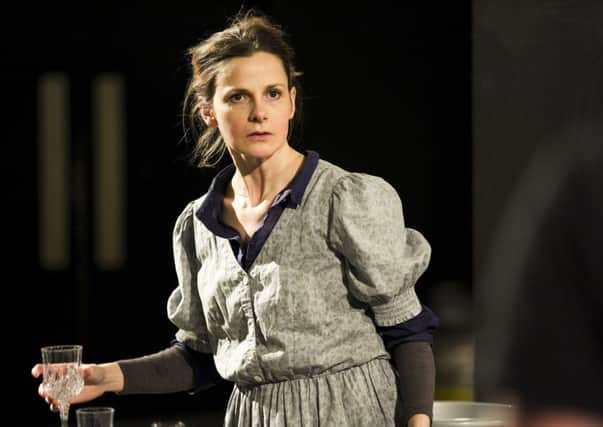Theatre review: Miss Julie


Originally set in 19th century Sweden, the titular lead is a young aristocrat lusting after her father’s footman at a servants dance.
But he’s already engaged to the estate’s cook - who remains in the background throughout - and is painfully aware of the scandal that such indiscretions can cause.
Advertisement
Hide AdAdvertisement
Hide AdAs passions erupt, the usual boundaries between social classes begin to blur before falling apart completely.
Premiering at Glasgow’s Citizen’s Theatre, Zinnie Harris’s version transfers the action to early 20th century Scotland, the unseen Scandinavian Count replaced by a Highland Laird.
It plays out against a uniformly beige backdrop - a kind of Victorian-era Ikea blandness which satisfyingly accentuates and amplifies the impact of the emotional plot.
Louise Brealey (best known for playing Molly in the BBC’s Sherlock) is wonderful in the title roll, turning Miss Julie into the classic spoilt socialite, by turns haughtily and fragile.
Advertisement
Hide AdAdvertisement
Hide AdKeith Fleming is a worthy foil as John, the well-travelled but resolutely working class object of her affection whose motivation is unclear as he swings between kindness and cruelty - towards both Miss Julie and his stoic fiancée (played with admirable restraint by Jessica Hardwick).
But there’s something missing here, with the translation lacking the finesse of the original and unwilling to add anything substantial to justify the (slightly) updated setting.
Crucially, Miss Julie herself never comes across as being in control - a cornerstone of the powerplay that is the most interesting part of the story.
Even in the early exchanges where she teases and cajoles John, it’s always the theoretically subservient man who seems to have the upper hand - making the eventual fate of Miss Julie less of a shock.
Advertisement
Hide AdAdvertisement
Hide AdInstead of a finely-balanced battle of the sexes it comes across as a soap opera filled with melodrama, while contemporary phrasing sits uneasily with the otherwise period feel - particularly in the jarring use of swear words.
It’s certainly an effective drama but one which seems to shy away from the big issues that run through the very fabric of Strindberg’s vision.